助动词shall、will、should、would的用法区别
- 格式:doc
- 大小:17.00 KB
- 文档页数:4
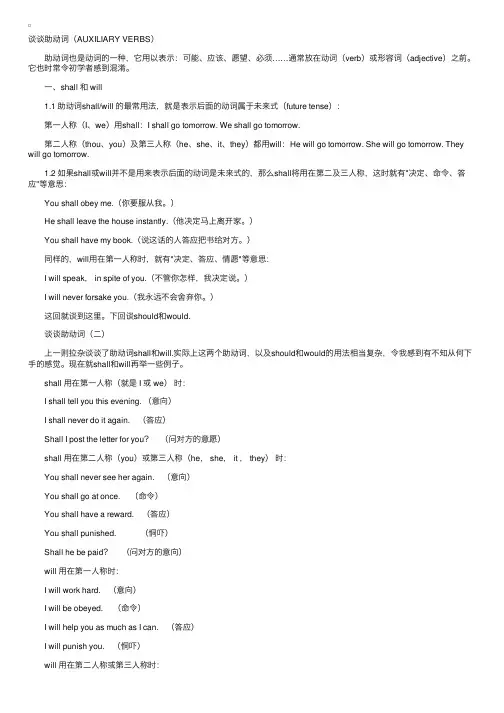
谈谈助动词(AUXILIARY VERBS) 助动词也是动词的⼀种,它⽤以表⽰:可能、应该、愿望、必须……通常放在动词(verb)或形容词(adjective)之前。
它也时常令初学者感到混淆。
⼀、shall 和 will 1.1 助动词shall/will 的最常⽤法,就是表⽰后⾯的动词属于未来式(future tense): 第⼀⼈称(I、we)⽤shall:I shall go tomorrow. We shall go tomorrow. 第⼆⼈称(thou、you)及第三⼈称(he、she、it、they)都⽤will:He will go tomorrow. She will go tomorrow. They will go tomorrow. 1.2 如果shall或will并不是⽤来表⽰后⾯的动词是未来式的,那么shall将⽤在第⼆及三⼈称,这时就有"决定、命令、答应"等意思: You shall obey me.(你要服从我。
) He shall leave the house instantly.(他决定马上离开家。
) You shall have my book.(说这话的⼈答应把书给对⽅。
) 同样的,will⽤在第⼀⼈称时,就有"决定、答应、情愿"等意思: I will speak, in spite of you.(不管你怎样,我决定说。
) I will never forsake you.(我永远不会舍弃你。
) 这回就谈到这⾥。
下回谈should和would. 谈谈助动词(⼆) 上⼀则拉杂谈谈了助动词shall和will.实际上这两个助动词,以及should和would的⽤法相当复杂,令我感到有不知从何下⼿的感觉。
现在就shall和will再举⼀些例⼦。
shall ⽤在第⼀⼈称(就是 I 或 we)时: I shall tell you this evening. (意向) I shall never do it again. (答应) Shall I post the letter for you? (问对⽅的意愿) shall ⽤在第⼆⼈称(you)或第三⼈称(he, she, it , they)时: You shall never see her again. (意向) You shall go at once. (命令) You shall have a reward. (答应) You shall punished. (恫吓) Shall he be paid? (问对⽅的意向) will ⽤在第⼀⼈称时: I will work hard. (意向) I will be obeyed. (命令) I will help you as much as I can. (答应) I will punish you. (恫吓) will ⽤在第⼆⼈称或第三⼈称时: You will send in your report on Thursday. (命令) Whatever you may say, things of this kind will go on. (必然性) Will you help me? (请求) Will you tell me about it? (请求) You will sit here for hours saying nothing. (表⽰习惯) 下来谈谈should 和 would 三、助动词should 的⽤法: 3.1 should ⽤在第⼀⼈称时: I should be glad to see you if you would call tomorrow morning. (条件) I should be glad to see you. (省略条件⼦句conditional clause) (条件) We should sort out this problem at once. (决定) I think we should check everything again. (劝告) 3.2 should ⽤在第⼆⼈称或第三⼈称时: Should you like to see him if he should call on you this evening? (表⽰将来) Should you like to see him. (省略条件⼦句conditional clause) It's a pity you should always be so busy. (看法) If you should see Peter, tell him about the match. (可能) You should apply for a visa right away. (责任) If it should be fine tomorrow, I shall go out. (条件) It is a pity that she should be so ill. 3.3 should ⽤在任何⼈称时: I / You/ He/ She/ They should study hard. (义务或责任) 四、助动词would 的⽤法: 4.1 would ⽤在第⼀⼈称时: If I could, I would work hard. (意向) I would be obeyed. (命令) I would help you as much as I could. (答应) I would punish you if you should do it again. (恫吓) 4.2 would ⽤在第⼆⼈称或第三⼈称时: If you were a bird, you would be able to fly. (将来) Would you tell me about it?(请求) Would you help me?(请求) Would you were with us! (愿望) He would keep playing with my watch. (持续) They wouldn't (would not) believe me. (拒绝) Would you mind if I brought a colleague with me? (许可) Would you pass the salt please? (请求) Would you mind waiting a moment?(请求) Would you like to play golf this Friday?(邀请) shall / will / should / would 真是千头万绪,真没办法。
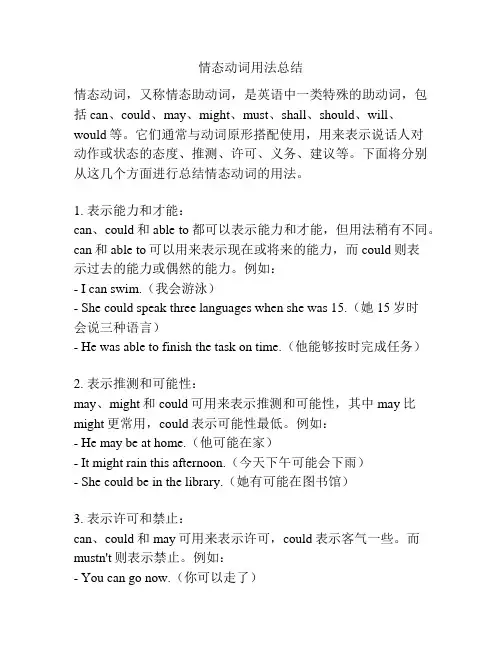
情态动词用法总结情态动词,又称情态助动词,是英语中一类特殊的助动词,包括can、could、may、might、must、shall、should、will、would等。
它们通常与动词原形搭配使用,用来表示说话人对动作或状态的态度、推测、许可、义务、建议等。
下面将分别从这几个方面进行总结情态动词的用法。
1. 表示能力和才能:can、could和able to都可以表示能力和才能,但用法稍有不同。
can和able to可以用来表示现在或将来的能力,而could则表示过去的能力或偶然的能力。
例如:- I can swim.(我会游泳)- She could speak three languages when she was 15.(她15岁时会说三种语言)- He was able to finish the task on time.(他能够按时完成任务)2. 表示推测和可能性:may、might和could可用来表示推测和可能性,其中may比might更常用,could表示可能性最低。
例如:- He may be at home.(他可能在家)- It might rain this afternoon.(今天下午可能会下雨)- She could be in the library.(她有可能在图书馆)3. 表示许可和禁止:can、could和may可用来表示许可,could表示客气一些。
而mustn't则表示禁止。
例如:- You can go now.(你可以走了)- Could I use your computer?(我能用一下你的电脑吗?)- You mustn't smoke here.(你不能在这里抽烟)4. 表示义务和必要性:must表示主观上的义务和必要性,常用来表示说话人的主观判断。
have to则表示客观上的必要性和强制性。
例如:- I must finish my homework tonight.(我必须今晚完成作业)- I have to get up early tomorrow.(我明天必须早起)5. 表示建议和推荐:should和ought to都表示建议或推荐,should更常用一些,ought to用得相对较少。
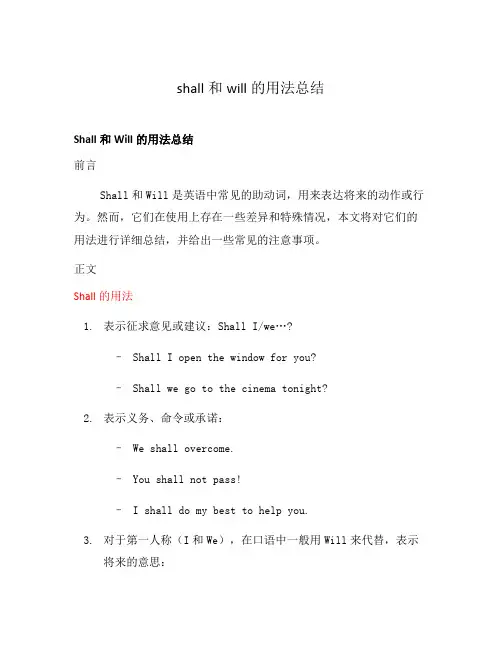
shall和will的用法总结Shall和Will的用法总结前言Shall和Will是英语中常见的助动词,用来表达将来的动作或行为。
然而,它们在使用上存在一些差异和特殊情况,本文将对它们的用法进行详细总结,并给出一些常见的注意事项。
正文Shall的用法1.表示征求意见或建议:Shall I/we…?–Shall I open the window for you?–Shall we go to the cinema tonight?2.表示义务、命令或承诺:–We shall overcome.–You shall not pass!–I shall do my best to help you.3.对于第一人称(I和We),在口语中一般用Will来代替,表示将来的意思:–I will help you.–We will meet at the restaurant.Will的用法1.表示愿望、意愿或决心:–I will become a successful writer one day.–She will never give up on her dreams.2.表示将来的动作或事件:–They will arrive tomorrow.–Will you be home for dinner?3.对于第二人称(You),常用Will来表示委婉的请求或建议:–Will you please pass me the salt?–Will you join us for the party?特殊情况和注意事项1.Shall可以用于提出建议和征询意见,但在现代英语中已经不常使用,通常使用Should来代替。
2.在疑问句中,用Shall来询问对方的意愿或提出建议比较正式和礼貌。
3.在口语中,Shall常常被替换为Will,尤其是在第一人称(I和We)的情况下。
4.在现代英语中,Will被普遍用于表示将来的动作或事件,是最常用的表达方式之一。
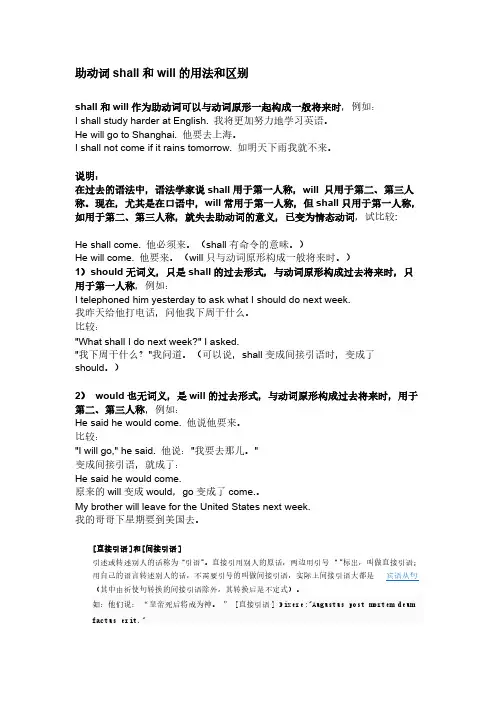
助动词shall和will的用法和区别shall和will作为助动词可以与动词原形一起构成一般将来时,例如:I shall study harder at English. 我将更加努力地学习英语。
He will go to Shanghai. 他要去上海。
I shall not come if it rains tomorrow. 如明天下雨我就不来。
说明:在过去的语法中,语法学家说shall用于第一人称,will 只用于第二、第三人称。
现在,尤其是在口语中,will常用于第一人称,但shall只用于第一人称,如用于第二、第三人称,就失去助动词的意义,已变为情态动词,试比较:He shall come. 他必须来。
(shall有命令的意味。
)He will come. 他要来。
(will只与动词原形构成一般将来时。
)1)should无词义,只是shall的过去形式,与动词原形构成过去将来时,只用于第一人称,例如:I telephoned him yesterday to ask what I should do next week.我昨天给他打电话,问他我下周干什么。
比较:"What shall I do next week?" I asked."我下周干什么?"我问道。
(可以说,shall变成间接引语时,变成了should。
)2)would也无词义,是will的过去形式,与动词原形构成过去将来时,用于第二、第三人称,例如:He said he would come. 他说他要来。
比较:"I will go," he said. 他说:"我要去那儿。
"变成间接引语,就成了:He said he would come.原来的will变成would,go变成了come.。
My brother will leave for the United States next week.我的哥哥下星期要到美国去。

助动词的用法归纳嘿,咱今天来好好唠唠助动词的用法!先来说说啥是助动词哈。
助动词呢,就像是帮助主要动词的小助手,让句子的意思更完整、更准确。
比如说“can”“could”“may”“might”“must”“shall”“should”“will”“would”等等,这些都是常见的助动词。
就拿我之前遇到的一件小事来说吧。
有一次我在公园里散步,看到一个小朋友想要爬上高高的滑梯,他妈妈在旁边问他:“Can you climb up there safely?” 这里的“can”就是助动词,用来询问小朋友是否有能力安全地爬上滑梯。
小朋友自信地回答:“Yes, I can!” 你看,这小小的“can”就把他们之间的交流变得清晰明了。
助动词在句子中的作用可多啦!有的助动词能表示能力,像“can”和“could”。
比如说“ I can swim very well” 这就表明“我”具备游泳这个能力。
还有表示许可的,像“may”和“might”。
比如,“May I come in?” 这就是在请求许可,问能不能进来。
“must”呢,则通常用来表示必须、一定。
比如说,“You must finish your homework before watching TV” 这就是在强调完成作业的必要性。
“shall”和“should”也有它们的用处。
“Shall we go shopping this afternoon?” 这里的“shall”是用来提出建议。
而“should”呢,更多是表示应该,像“You should drink more water to keep healthy” 就是在说为了保持健康应该多喝水。
“will”和“would”在表达意愿和将来时态时经常出现。
“I will go to Beijing next week” 这就是在说未来的计划。
“Would you like some coffee?” 这里的“would”则是更委婉地询问意愿。
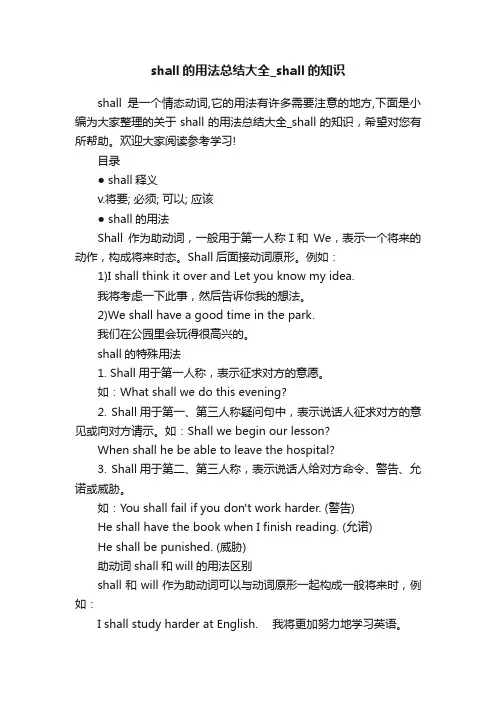
shall的用法总结大全_shall的知识 shall是一个情态动词,它的用法有许多需要注意的地方,下面是小编为大家整理的关于shall的用法总结大全_shall的知识,希望对您有所帮助。欢迎大家阅读参考学习! 目录 ● shall释义 v.将要; 必须; 可以; 应该 ● shall的用法 Shall作为助动词,一般用于第一人称Ⅰ和We,表示一个将来的动作,构成将来时态。Shall后面接动词原形。例如: 1)I shall think it over and Let you know my idea. 我将考虑一下此事,然后告诉你我的想法。 2)We shall have a good time in the park. 我们在公园里会玩得很高兴的。 shall的特殊用法 1. Shall用于第一人称,表示征求对方的意愿。 如:What shall we do this evening? 2. Shall用于第一、第三人称疑问句中,表示说话人征求对方的意见或向对方请示。如:Shall we begin our lesson? When shall he be able to leave the hospital? 3. Shall用于第二、第三人称,表示说话人给对方命令、警告、允诺或威胁。 如:You shall fail if you don't work harder. (警告) He shall have the book when I finish reading. (允诺) He shall be punished. (威胁) 助动词shall和will的用法区别 shall和will作为助动词可以与动词原形一起构成一般将来时,例如: I shall study harder at English. 我将更加努力地学习英语。 He will go to Shanghai. 他要去上海。 说明: 在过去的语法中,语法学家说shall用于第一人称,will 只用于第二、第三人称。现在,尤其是在口语中,will常用于第一人称,但shall只用于第一人称,如用于第二、第三人称,就失去助动词的意义,已变为情态动词,试比较: He shall come. 他必须来。(shall有命令的意味。) He will come. 他要来。(will只与动词原形构成一般将来时。) shall和should的用法区别 shall和should用作助动词时, should是shall的过去式;用作情态动词时, shall和should是两个不同的词。 shall的用法: 1. shall表义务,用于第二、第三人称。如: You shall do as you see me do. 你照我的样子办。 He shall be punished if he disobeys. 他若不服从就要受到处罚。 在当代英语中,shall多用于正式法律文字。如: The vendor shall maintain the equipment in good repair. 卖方须完好地维护设备。 shall有时在从句中相当于must。如: It has been decided that the proposal shall not be opposed. 已经决定不得反对这项提议。 2. shall表许诺,用于第二、第三人称,用于肯定句和否定句。如: You shall have my answer tomorrow. 你明天可以得到我的答复。 She shall get her share. 她可以得到她的一份。 3. shall表征询意见,用于第一、第三人称,并用于疑问句。如: Shall I get you some coffee, Miss Fleure? 费勒小姐,我给您点儿咖啡好吗? What shall he do next? 他下一步干什么呢? should的用法: 1. 用于第一人称疑问句,表征询意见。如: Should I open the window? 我可以开窗户吗? 2. should表义务,可用于各种句式,通常指将来。如: You should do what your parents tell you. 你应该照你父母的话去做事。 He should do some work, but he doesn’t want to. 他应该做些工作,但是他不想做。 也可指现在。如: You shouldn’t feel so unhappy over such trifles. 对这种小事,你不应该感到这么不高兴。 You shouldn’t be sitting in the sun. 你不应该坐在阳光下。 3. should表推测,暗含很大的可能。如: It’s 4:30. They should be in New York by now. 现在是四点半,他们应该到达纽约了。 Three weeks should suffice. 三个星期应该足够了。 4. should可在某些从句中,表虚拟语气。如: I suggest that you should stay here as if nothing had happened. 我建议你应该待在这儿,好像什么事也没有发生。 She was terrified lest they should go on talking about her. 她感到害怕,唯恐他们再说她的事。 If he should drop in, give him my message. 他若来访,就将我的消息给他。 5. should表感情色彩,常用在以why, how开头的疑问句中。如: Why shouldn’t you invite him? 为什么你不邀请他? I don’t see why we shouldn’t make friends. 我不明白为什么我们竟不能成为朋友。 How should I know? 我怎么知道? 在that引导的从句中,should也可表惋惜、忧虑、欢乐、惊讶等感情色彩。如: I’m sorry that you should think so badly of me. 你竟把我想得这样坏,我感到遗憾。 It is absurd that such things should happen to a family like theirs. 真可笑,这种事竟发生在他们那样的家庭中。 should还用于一些特殊结构,表感情色彩。如: That it should come to this! 事情竟到了这种地步! To think that it should have happened to me! 谁想到这种事竟发生在我身上! ● shall例题 If your car______any attention during the first 12 months, take it to an authorized dealer. A. shall need B.should need 答案应该是B should。 这道题考查的是真实条件句用should do形式,为正式语体。在早期英语中,真实条件句(即有可能实现的条件)中因为表示的未必是事实,要用动词原型式虚拟语气。后来演变到用should do代替动词原型。发展到现代英语,则用陈述语气代替了动词原型表示有可能实现的条件(真实条件句)。但过渡型的should do形式在正式语体中仍然使用,尤其是正式书面语。shall作为情态动词,表示说话人的意志。这个条件句的假设一辆车需要保养或维修是格格不入的。因此shall为错误。答案毫无疑问是should do. 这个句子中如果条件句用一般现在时,也是正确的。语体没有should do正式,为日常英语用法。 if从句谓语用should do形式,主句可以是陈述语气、祈使语气,也可以是虚拟语气。 If it should rain tomorrow, they will stay at home. 陈述语气 If it should rain tomorrow, stay at home. 祈使语气 If it should rain tomorrow, they would stay at home. 虚拟语气
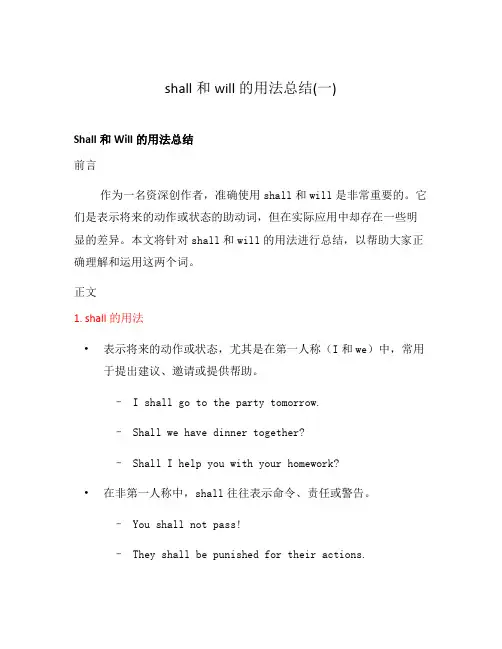
shall和will的用法总结(一)Shall和Will的用法总结前言作为一名资深创作者,准确使用shall和will是非常重要的。
它们是表示将来的动作或状态的助动词,但在实际应用中却存在一些明显的差异。
本文将针对shall和will的用法进行总结,以帮助大家正确理解和运用这两个词。
正文1. shall的用法•表示将来的动作或状态,尤其是在第一人称(I和we)中,常用于提出建议、邀请或提供帮助。
–I shall go to the party tomorrow.–Shall we have dinner together?–Shall I help you with your homework?•在非第一人称中,shall往往表示命令、责任或警告。
–You shall not pass!–They shall be punished for their actions.–The warning sign shall be placed at the entrance. 2. will的用法•表示将来的动作或状态,常用于陈述、预测、意愿或习惯。
–He will arr ive at 10 o’clock tomorrow.–It will rain later today.–I will try my best to finish the project on time.–She will often go jogging in the park.3. shall与will的区别•shall多用于第一人称(I和we),表示愿意、建议、命令等,语气较为委婉。
•will用于所有人称,表示预测、意愿、习惯等,语气较为直接。
4. 疑问句和否定句中的shall和will•在疑问句和否定句中,通常使用will来代替shall,以避免误解。
–Shall I come with you? → Should I come with you?–Shall we go to the party? → Will we go to theparty?–You shall not pass! → You will not pass!结尾掌握shall和will的用法对于准确表达将来的动作或状态至关重要。
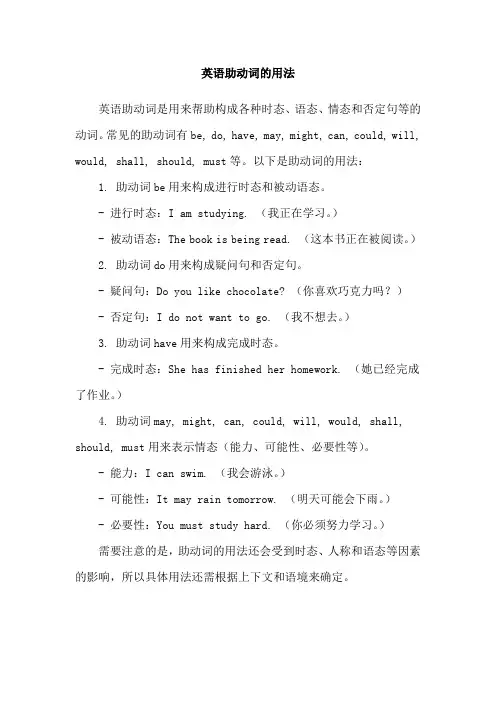
英语助动词的用法
英语助动词是用来帮助构成各种时态、语态、情态和否定句等的动词。
常见的助动词有be, do, have, may, might, can, could, will, would, shall, should, must等。
以下是助动词的用法:
1. 助动词be用来构成进行时态和被动语态。
- 进行时态:I am studying. (我正在学习。
)
- 被动语态:The book is being read. (这本书正在被阅读。
) 2. 助动词do用来构成疑问句和否定句。
- 疑问句:Do you like chocolate? (你喜欢巧克力吗?)
- 否定句:I do not want to go. (我不想去。
)
3. 助动词have用来构成完成时态。
- 完成时态:She has finished her homework. (她已经完成了作业。
)
4. 助动词may, might, can, could, will, would, shall, should, must用来表示情态(能力、可能性、必要性等)。
- 能力:I can swim. (我会游泳。
)
- 可能性:It may rain tomorrow. (明天可能会下雨。
)
- 必要性:You must study hard. (你必须努力学习。
)需要注意的是,助动词的用法还会受到时态、人称和语态等因素的影响,所以具体用法还需根据上下文和语境来确定。
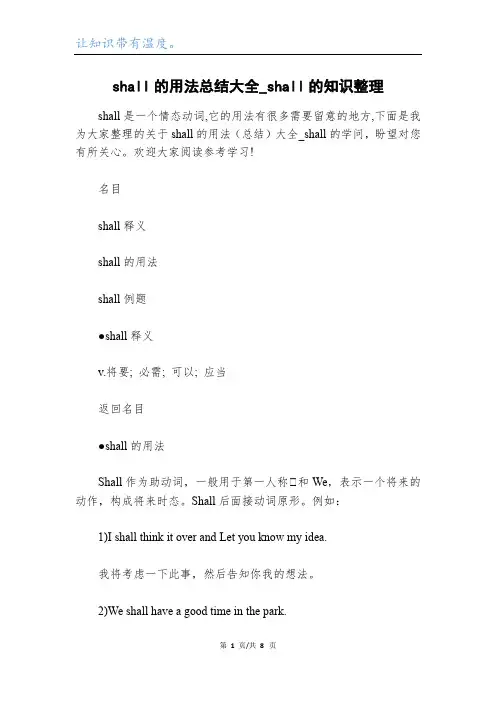
shall的用法总结大全_shall的知识整理shall是一个情态动词,它的用法有很多需要留意的地方,下面是我为大家整理的关于shall的用法(总结)大全_shall的学问,盼望对您有所关心。
欢迎大家阅读参考学习!名目shall释义shall的用法shall例题●shall释义v.将要; 必需; 可以; 应当返回名目●shall的用法Shall作为助动词,一般用于第一人称Ⅰ和We,表示一个将来的动作,构成将来时态。
Shall后面接动词原形。
例如:1)I shall think it over and Let you know my idea.我将考虑一下此事,然后告知你我的想法。
2)We shall have a good time in the park.我们在公园里会玩得很兴奋的。
shall的特别用法1. Shall用于第一人称,表示征求对方的意愿。
如:What shall we do this evening?2. Shall用于第一、第三人称疑问句中,表示说话人征求对方的意见或向对方请示。
如:Shall we begin our lesson?When shall he be able to leave the hospital?3. Shall用于其次、第三人称,表示说话人给对方命令、警告、承诺或威逼。
如:You shall fail if you dont work harder. (警告)He shall have the book when I finish reading. (承诺)He shall be punished. (威逼)助动词shall和will的用法区分shall和will作为助动词可以与动词原形一起构成一般将来时,例如:I shall study harder at English.我将更加努力地(学习英语)。
He will go to Shanghai.他要去上海。
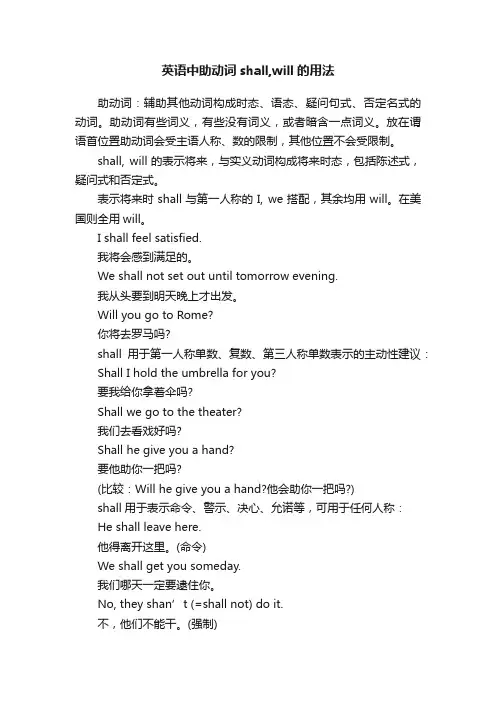
英语中助动词shall,will的用法助动词:辅助其他动词构成时态、语态、疑问句式、否定名式的动词。
助动词有些词义,有些没有词义,或者暗含一点词义。
放在谓语首位置助动词会受主语人称、数的限制,其他位置不会受限制。
shall, will的表示将来,与实义动词构成将来时态,包括陈述式,疑问式和否定式。
表示将来时shall与第一人称的I, we搭配,其余均用will。
在美国则全用will。
I shall feel satisfied.我将会感到满足的。
We shall not set out until tomorrow evening.我从头要到明天晚上才出发。
Will you go to Rome?你将去罗马吗?shall用于第一人称单数、复数、第三人称单数表示的主动性建议:Shall I hold the umbrella for you?要我给你拿着伞吗?Shall we go to the theater?我们去看戏好吗?Shall he give you a hand?要他助你一把吗?(比较:Will he give you a hand?他会助你一把吗?)shall用于表示命令、警示、决心、允诺等,可用于任何人称:He shall leave here.他得离开这里。
(命令)We shall get you someday.我们哪天一定要逮住你。
No, they shan’t (=shall not) do it.不,他们不能干。
(强制)will用于疑问句,表示邀请或者请求:Will you give me another pear?你再给我一个梨子好吗?Do me a favor, will you?帮我个忙,好吗?will用于陈述句,表示意愿:I will never mention him again.我再也不愿提起他了。
He will not let you down.他不会对不起你们的。
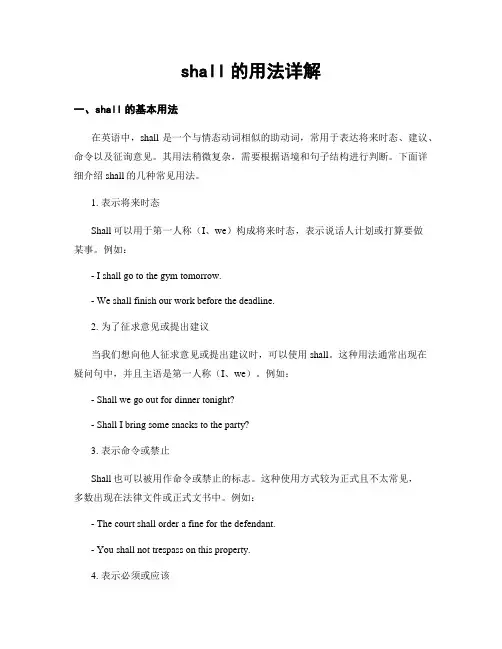
shall的用法详解一、shall的基本用法在英语中,shall是一个与情态动词相似的助动词,常用于表达将来时态、建议、命令以及征询意见。
其用法稍微复杂,需要根据语境和句子结构进行判断。
下面详细介绍shall的几种常见用法。
1. 表示将来时态Shall可以用于第一人称(I、we)构成将来时态,表示说话人计划或打算要做某事。
例如:- I shall go to the gym tomorrow.- We shall finish our work before the deadline.2. 为了征求意见或提出建议当我们想向他人征求意见或提出建议时,可以使用shall。
这种用法通常出现在疑问句中,并且主语是第一人称(I、we)。
例如:- Shall we go out for dinner tonight?- Shall I bring some snacks to the party?3. 表示命令或禁止Shall也可以被用作命令或禁止的标志。
这种使用方式较为正式且不太常见,多数出现在法律文件或正式文书中。
例如:- The court shall order a fine for the defendant.- You shall not trespass on this property.4. 表示必须或应该有时,shall还可用于表达某种义务、责任或强制性要求。
这种用法较为严肃,并通常出现在合同或正式文件中。
例如:- The tenant shall pay the rent on time.- All employees shall follow the company's code of conduct.二、shall的用法扩展除了上述基本用法外,shall还可以和其他词搭配,形成一些特定的表达方式。
1. Shall we?在日常对话中,我们常用"Shall we?"来征求对方的意见,表示提议或建议做某事。
shall与will的区别1.shall一般用于第一人称,will一般用于二三人称eg: shall we go to the park.will you go with me.【另外】助动词shall和will的用法和区别shall和will作为助动词可以与动词原形一起构成一般将来时。
eg: I shall study harder at English.我将更加努力地学习英语。
He will go to Shanghai.他要去上海。
I shall not come if it rains tomorrow.如果明天下雨我就不来。
My brother will leave for the United States next week.我的哥哥下星期要到美国去。
【注】在过去的语法中,语法学家说 shall用于第一人称,will 只用于第二、第三人称。
现在,尤其是在口语中,will也常用于第一人称。
关于“shall/will”的用法的五个规则:I说或写都尽量使用“I'll, You'll, He'll , She'll , It'll, We'll ,They'll …”的简缩形。
eg:①I’ll answer your question.②You’ll read my blog.③He’ll point out my mistake.④She’ll like my essays.⑤It’ll be a hot night for me.⑥We’ll go to bed.⑦They’ll wake up here.II要表达主语的“意志”,通常都用“will”(文法上称为意志将来。
)eg:I won't see him again.我不愿意再和他见面。
Who will go and help that poor old man?谁愿意去帮助那个可怜的老人?Mary will. (玛丽愿意。
情态动词shall情态动词shall ,will ,should和would 在不同的句子中含有不同的意思,其基本用法如下:一、shall1. 表示说话者的意图、允许、警告、命令、决心等,用于陈述句的第二、第三人称中,有必须,应,可之意。
例如:1)You shall have that book tomorrow.2) He shall be punished if he insists on doing that.2,. 在问句中表示征求对方意见,主要用于第一、第三人称,有“…..好吗”,“要不要”等意思。
例如“1) Shall I fetch the hammer?2) Shall those goods be sent over to you at once?3) Shall we help you?2. 用在表示意图、要求等的从句中,有“应该”,“要”之意,例如:My demand is that is shall be done in time.二、should1.表示义务、责任、建议或劝告,有“应当、应该”的意思。
例如:1) You should learn from each other.2) You shouldn’t be so careless.3) He should have told me the news earlier.(should + have + 过去分词)表示对过去本该做的事而没有做,其否定形式是对过去本不做的事而做了的固定句型。
2.与why ,who ,how等词连用,表示意外、惊异等,有“竟会”等意思。
例如:1) How should I know?2) Why should you be so late today?3.用于表示建议、命令、决定等的从句中,有“应该、必须”的意思。
例如:1) The young doctor proposed that he should try the experiment on himself.2) It was decided that we should start a cleanup at once.4。
【精品文档】小升初语法必备:助动词shall和will的用法和区别word版本本文部分内容来自网络整理,本司不为其真实性负责,如有异议或侵权请及时联系,本司将立即删除!== 本文为word格式,下载后可方便编辑和修改! ==小升初语法必备:助动词shall和will的用法和区别& nbsp ;【小编寄语】今天英语网小编教给同学们的是小升初语法必备:助动词shall 和 will 的用法和区别,一起来学习下吧!祝同学们学习进步!助动词 shall 和 will 的用法和区别shall 和 will 作为助动词可以与动词原形一起构成一般将来时。
例如:I shall study harder at English .我将更加努力地学习英语。
He will go to Shanghai .他要去上海。
I shall not come if it rains tomorrow .如明天下雨我就不来。
My brother will leave for the United States next week .我的哥哥下星期要到美国去。
在过去的语法中,语法学家说 shall 用于第一人称, will 只用于第二、第三人称。
现在,尤其是在口语中, will 也常用于第一人称。
关于& ldquo ; shall / will 的用法的五个规则:① 说或写都尽量使用& ldquo ; I ' ll , You ' ll , He ' ll , She ' ll , It ' ll , We ' ll , They ' ll & hellip ;的简缩形。
例如:I ' ll answer your question .。
助动词的用法初中在初中英语学习中,助动词是一个重要的语法点。
掌握助动词的用法对于正确表达英语句子的时态、语态、语气等方面起着关键作用。
接下来,让我们一起深入了解一下初中阶段常见的助动词及其用法。
首先,常见的助动词有 be 动词(am/is/are/was/were)、do/does/did 、have/has/had 、will/would 、shall/should 等。
be 动词主要用来构成进行时态和被动语态。
当我们表示正在进行的动作时,会用到“be +动词的现在分词”形式。
例如,“I am reading a book now”(我现在正在读一本书。
)这里的“am reading”就是现在进行时,“am”就是助动词。
而在被动语态中,“be +动词的过去分词”则用来强调动作的承受者。
比如,“The book is read by many people”(这本书被很多人读过。
)“is”在这个句子中帮助构成了被动语态。
do/does/did 这一组助动词常用于构成一般现在时和一般过去时的否定句和疑问句。
在一般现在时中,如果主语是第三人称单数,我们用“does”,其他情况用“do”。
例如,“He doesn't like sports”(他不喜欢运动。
)“Do you have a pen?”(你有一支笔吗?)在一般过去时中,无论主语是什么,都用“did”。
像“They didn't go to school yesterday”(他们昨天没去上学。
)have/has/had 用于构成完成时态。
“have/has +动词的过去分词”是现在完成时,“had +动词的过去分词”则是过去完成时。
比如,“I havefinished my homework”(我已经完成了我的作业。
)“She had left whenI arrived”(我到的时候她已经离开了。
)will/would 用于表示将来时态。
助动词should,would的用法
1)should无词义,只是shall的过去形式,与动词原形构成过去将来时,只用于第一人称,
例如:
I telephoned him yesterday to ask what I should do next week.
我昨天给他打电话,问他我下周干什么。
比较:
"What shall I do next week?" I asked.
"我下周干什么?"我问道。(可以说,shall变成间接引语时,变成了should。)
2) would也无词义,是will的过去形式,与动词原形构成过去将来时,用于第二、第三
人称,例如:
He said he would come. 他说他要来。
比较:
"I will go," he said. 他说:"我要去那儿。"
变成间接引语,就成了:
He said he would come.
原来的will变成would,go变成了come.。
感谢您的阅读,祝您生活愉快。
情态助动词的意义和用法1.情态助动词的意义:情态助动词是用来表示说话者的态度、观点、意愿、能力、推测等的词。
它们不与主语发生一致的变化,也不能单独作谓语,而是和其他动词搭配使用,构成复合谓语形式。
2. 情态助动词的列表:常见的情态助动词包括can、could、may、might、shall、should、will、would、must、ought to等。
其中,can、could表示能力,may、might表示可能性,shall、should表示义务或建议,will、would表示意愿,must表示必要性,ought to表示道义义务等。
3. 表示能力:can和could表示人具有其中一种能力。
can通常用于表示一般的能力,could则表示在过去或特定情境下的能力。
例如:- I can swim.(我会游泳。
)- When I was young, I could climb trees easily.(我年轻时轻松地能爬树。
)4. 表示可能性:may和might表示其中一种可能性或推测。
may表示较大的可能性,might则表示较小的可能性。
例如:- It may rain later.(也许会下雨。
)- He might be busy.(他可能忙。
)5. 表示意愿:will和would表示人的意愿。
will用于一般的意愿表示,would则表示更客气或委婉的表达。
例如:- I will help you with your homework.(我会帮你做作业。
)- Would you like some tea?(你要喝点茶吗?)6. 表示义务或建议:shall和should表示其中一种义务或建议。
shall用于询问,should用于陈述。
例如:- Shall we go to the party together?(我们一起去参加派对好吗?)- You should study for the exam.(你应该为考试学习。
助动词shall、will、should、would的用法区别
1)shall和will作为助动词可以与动词原形一起构成一般将来时,例如:
I shall study harder at English.我将更加努力地学习英语。
He will go to Shanghai.他要去上海。
说明:
在过去的语法中,语法学家说shall用于第一人称,will 只用于第二、第三人称。
现在,尤其是在口语中,will常用于第一人称,但shall只用于第一人称,如用于第二、第三人称,就失去助动词的意义,已变为情态动词,试比较:
He shall come.他必须来。
(shall有命令的意味。
)
He will come.他要来。
(will只与动词原形构成一般将来时。
)
2)should无词义,只是shall的过去形式,与动词原形构成过去将来时,只用于第一人称,例如:
I telephoned him yesterday to ask what I should do next week.
我昨天给他打电话,问他我下周干什么。
比较:
"What shall I do next week?"I asked.
"我下周干什么?"我问道。
(可以说,shall变成间接引语时,变成了should。
)
3) would也无词义,是will的过去形式,与动词原形构成过去将来时,用于第二、第三人称,例如:
He said he would come.他说他要来。
比较:
"I will go," he said. 他说:"我要去那儿。
"
变成间接引语,就成了:
He said he would come.
原来的will变成would,go变成了come.
高中英语作文连接词与连接句汇总
过度词
1)递进:furthermore,moreover,besides,inaddition
2)转折:however,but,nevertheless,after all
3)总结:finally,at last,in brief,to conclude
4)强调:really,indeed,certainly,surely,above all
5)对比:in the same way, just as, on the other hand
中间段落句
1. 相反,有一些人赞成……,他们相信……,而且,他们认为……。
On the contrary,there are some people in favor of ___.At the same time,they say____.
2. 但是,我认为这不是解决……的好方法,比如……。
最糟糕的是……。
But I don"t think it is a very good way to solve ____.For example,____.Worst of all,___.
3. ……对我们国家的发展和建设是必不可少的,(也是)非常重要的。
首先,……。
而且……,最重要的是……
______is necessary and important to our country"s development and construction. First,______.What"s more, _____.Most important of all,______.
4. 有几个可供我们采纳的方法。
首先,我们可以……。
There are several measures for us to adopt. First, we can______
5. 面临……,我们应该采取一系列行之有效的方法来……。
一方面……,另一方面,
Confronted with______,we should take a series of effective measures to______. For one thing,______For another,______
6. 早就应该拿出行动了。
比如说……,另外……。
所有这些方法肯定会……。
It is high time that something was done about it. For example. _____.In addition. _____.All these measures will certainly______.
7. 为什么……?第一个原因是……;第二个原因是……;第三个原因是……。
总的来说,……的主要原因是由于……
Why______? The first reason is that ______.The second reason is ______.The third is ______.For all this, the main cause of ______due to ______.
8. 然而,正如任何事物都有好坏两个方面一样,……也有它的不利的一面,象……。
However, just like everything has both its good and bad sides, ______also has its own disadvantages, such as ______.
9. 尽管如此,我相信……更有利。
Nonetheless, I believe that ______is more advantageous.
10. 完全同意……这种观点(陈述),主要理由如下:
I fully agree with the statement that ______ because______.。